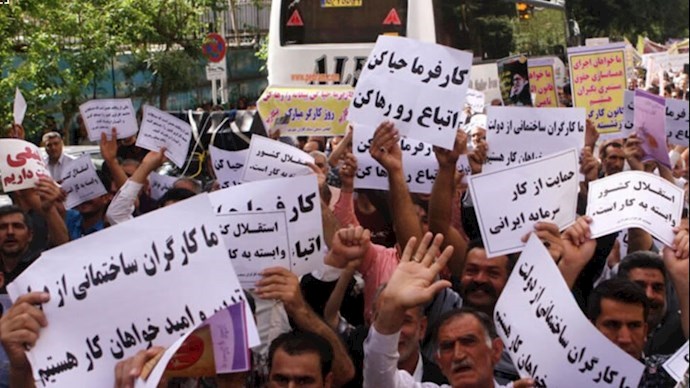Analysis by PMOI/MEK
Iran, May 4, 2021—In a society whose main characteristic is the domination of a misogynist system and whose first-line victims are women and workers, the system’s legitimacy should be studied with the perspective and selection of these first two victims.
May 1 was one of the most important days for measuring the votes of Iranian workers. Surprisingly, despite the spread of the fourth wave of the Covid-19 in Iran, workers took to the streets in more than 20 cities and cast their early vote on the regime’s upcoming presidential elections, scheduled for June 18. Their message was clear in their slogans: “We will not vote, we’ve heard too many lies.”
Iran's totalitarian rule in policy, economy, banking, and financial fields has established a system that is against the most basic rights of workers and wage earners. Thus, the power balance between Iranian society and the regime has been shaped by the people's struggle against corrupt economic rule and the banking and financial empire held by Iranian regime supreme leader Ali Khamenei and the Revolutionary Guards (IRGC).
The struggles of the Iranian workers for their basic rights targets the regime’s political-economic oligarchy. In the past decade, the demands of workers and labor activists have evolved from economic to political in nature, especially after the 2017 and 2019 uprisings. Their protests now manifest their opinion about the regime in its entirety.
During the week that marked the International Labor Day and Iran’s Teachers day, two important and fundamental segments of the society expressed their opposition to the regime. However, this year, Workers and Teachers Day were celebrated in a different manner. In the current socio-political climate in Iran, all developments are measured by the June 18 elections.
The regime wants to keep the society calm as it prepares for the elections. But fed up with growing corruption and repression, teachers and workers showed in their protests what the Iranian people think about the elections.
The workers’ slogans, chanted in at least 20 cities across Iran, reflected the common demands of the majority of Iran’s population:
- [The regime] is lying that our enemy is America, our enemy is right here
- We will only get our rights in the streets
- Arise workers, destroy the palace of the tyrant
- Freedom, justice, livelihood, the right of the whole nation
- Death to the oppressor, peace to the worker
- Worker! Worker! Speak out and demand your rights
- How long will we hear lies and deceit? We will not back down
Some of these slogans, which reflect the workers’ demands for more than three years, refer directly to the main reason of family’s economy crisis. The crisis that is rooted in Khamenei's office, banks and companies belonging to the Revolutionary Guards, and corrupt government institutions and foundations:
- The enemy of the workers is this corrupt government
- If one [government-involved] embezzlement is reduced, our problems will be solved
- No nation has seen this much injustice
- The insurance organization betrays [worker] and the parliament supports it
- Shame on our national TV
Some of the slogans expressed the workers’ views and opinions about the entire regime and its affiliated entities and foundations, and what they think of the elections and its outcome:
- Every worker must boycott the elections
- We will not vote anymore. We’ve heard too many lies
The vote of the Iranian people was reflected in the workers’ slogans. Interestingly, these same slogans are being chanted by members of other communities and different walks of life, including pensioners, farmers, and creditors.
No one appreciates the depth of the growing tension as well as the regime itself and its tightly controlled media outlets. “The wall of anger is being built brick by brick… The society is immersed in anger and violence,” the state-run Hamdeli daily wrote on April 25.
Arman, another newspaper, wrote on May 2, "Working in Iran drifted far from its true meaning. Not only the government-imposed minimum wages put the country's working-class family below the poverty line, but the lack of adequate support and oversight combined with the problems caused by Covid-19 over the past year have caused employers not to pay these wages. Statistics show that 30 percent of workers are demanding delayed paychecks. Labor activists report the existence of 7 million unregistered workers in the country who have been working in the country's labor market, but their activities have not been registered anywhere.
“In the past year, the Covid-19 outbreak has caused a reduction in production and income for employers, which has led to delays in the payment of wages for more than 30 percent of workers. We see in protest rallies by workers who are demanding their delayed paychecks. Currently, the food poverty line is 6.7 million rials per person, and if you consider a family of three with the minimum salary, many workers’ families are below the food poverty line.”
Farhikhtegan daily wrote on May 2: “A 43-percent decrease in purchasing power, a 123-year wait to buy a house in Tehran, and a rise in workers' consumer prices of up to 500 percent… Do not think that these four characteristics, which indicate the workers’ hard living conditions, apply to a class with a population of two or three million. According to statistics and Article 2 of the Labor Law, at least 15 million of the working population can be called workers."





